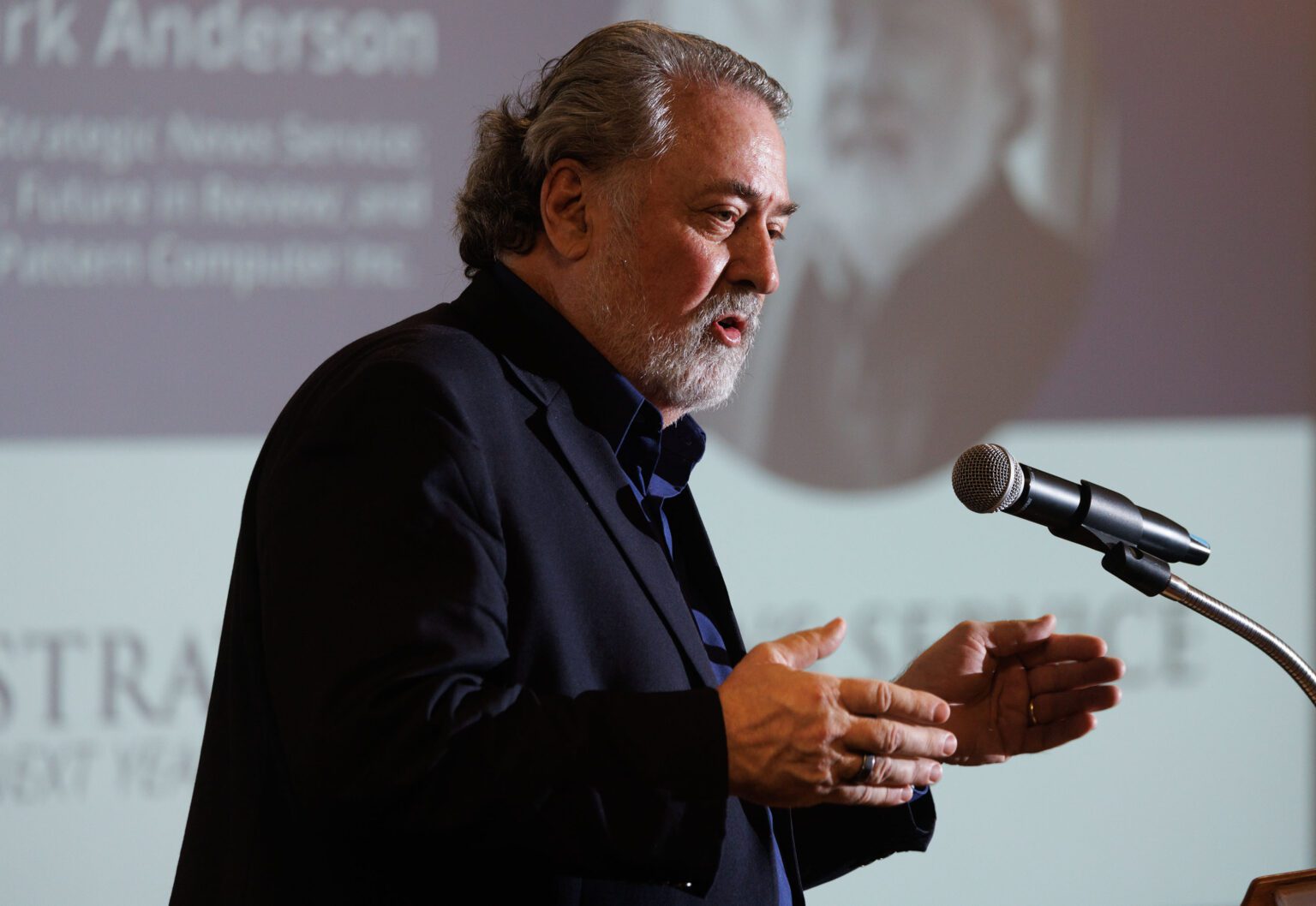Think CRINK. In business, don’t start with a hypothesis or other bias when reviewing information. Look for the patterns. Then make decisions accordingly.
That might be the overarching takeaway from a wide-ranging, thought-provoking Bellingham talk by veteran technologist and economics observer Mark Anderson. Anderson is CEO of Strategic News Service, the publisher of a respected weekly newsletter read globally by tech executives and investors. His work has spawned the long-running Future in Review conference and a Friday Harbor-based startup, Pattern Computer.
But it was his annual observations that the sold-out crowd at a Feb. 9 Rotary Club of Bellingham fundraising dinner had turned out to hear.
Anderson — who has been writing his newsletter since 1995 — didn’t disappoint in breadth or depth. His comments at the Bellingham Golf & Country Club were direct, but nuanced.
He laid the groundwork with an overview of the technology and economy landscapes which, he’d written in his newsletter, merged this year “as technology drives every sector of the global economy, and IP [intellectual property] is its asset class.” He cited developments in computer chips, artificial intelligence, energy and healthcare as illustrations of this shift.
When it comes to individual countries’ roles in the landscape, “We just ask, ‘What’s their business model — how do they make money?’” he said. “When we look at the world, we see inventing nations — and thieves.”
Prominent among the latter, Anderson contended, is China and a history of IP theft. “There is nothing more important to the global economy than chips,” he said. “If you make chips, you make money. If you steal chips, you make money. If you do neither, you make less.”
Anderson said that role also has implications for tech giants like Microsoft and Google and their efforts in helping build Chinese industrial and military AI, as well as for northwest Washington state companies which might have an export business and view increased Chinese government repression with concern.
“There are a lot of companies in Bellingham and up and down the coast. They are currently locked into the supply chain in China and they probably have a bad premonition,” Anderson said when I asked him how applicable this was to local businesses. “But let’s just say they don’t really have a good grip on how bad it’s gonna be.”

Anderson didn’t just single out what’s trending with China — he also highlighted Germany, Turkey, Japan, Australia and what he labeled the “CRINK” alliance (China, Russia, Iran and North Korea) — before turning to the predictions.
I doubt that I, or perhaps anyone, could do the tech and economics predictions justice in any summary. Anderson even said on stage that, “I read these verbatim — because I have to live by the sword when I see you next year” to gauge their accuracy.
But here’s a half-assessed sampling of the 10 for 2023; quotes come from the written version for Anderson’s SNS subscribers published in December:
• Facebook’s Metaverse represents a “mega failure to understand potential” (or, as he coined, a “MegaFUP”) with “billions of dollars down the rabbit hole.”
• Sports betting catches fire “at $50B+ for the next six months.”
• Crypto “craps out” as “you can’t have a currency without an army to back it.”
• Inflation keeps declining (with a note to Fed Chair Jerome Powell: “After you’ve killed the lion, you can stop pulling the trigger”).
• And, autonomous robot vehicles hit a safety “certification wall” and delayed deadlines because it’s hard for companies to explain why the AI inside them is doing what it does when human survival is at stake.
Yes. It’s a lot to take in, with five more not as easily summarized — think economic migration, climate change, e-currencies, neural networks and China (again). The spirited Q&A that followed covered everything from cancer medications to Orcas.
For San Juan Island’s Anderson, nearby Bellingham is a local audience and the predictions event a Bellingham tradition. It’s in its 18th year — the first 17 held with Whatcom County tech education nonprofit Technology Alliance Group for Northwest Washington and in 2023, hosted by Bellingham’s Rotary with the alliance group now a sponsor.
“Our Rotary Club serves all of Bellingham, and so I think we just go beyond the tech community,” said Paul Grey, Rotary president, about the prediction dinner’s importance to a broad base of businesses. “This kind of event is a deep dive into what’s really going on behind the scenes.”
Anderson, who calculated a 95.61% prediction accuracy average since 2005, is a deep thinker. But he doesn’t claim exclusivity.
He hoped attending business leaders would leave his talk with, “a new way of thinking, a new way of seeing. Recognizing for their own uses the power of seeing things, I call it, orthogonally.”
That amounts to evaluating developments not by words spoken about them or through a filter of anger or opinion, but “in terms of real data like actions and the patterns of those actions,” he said. “And if they catch on to that, they’ll do really well in whatever they’re doing.”
Places & Things
Bed Bath & Beyond will close its Bellingham store at 4255 Meridian St. as part of a new wave of store closures that includes Vancouver, Kennewick, Issaquah and Walla Walla in Washington state. The Auburn and Lakewood stores went into the great beyond in a previous wave. Its Burlington store at 1915 Marketplace Drive will remain open.

A company spokesperson said Bellingham’s selection was part of a “comprehensive, store-by-store analysis of our portfolio to ensure we can grow profitably while best serving our customers.” The company did not say when the Bellingham store would shut down, just that stores listed would close “over the next few weeks and months.”
(For the latest Places & Things, check here throughout the week.)
Frank Catalano’s column appears Wednesdays. Email: frankcatalano@cascadiadaily.com; Twitter @FrankCatalano.





